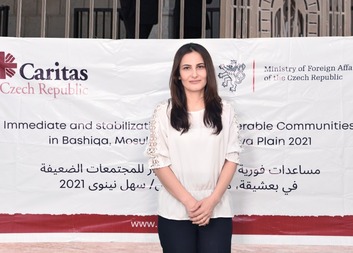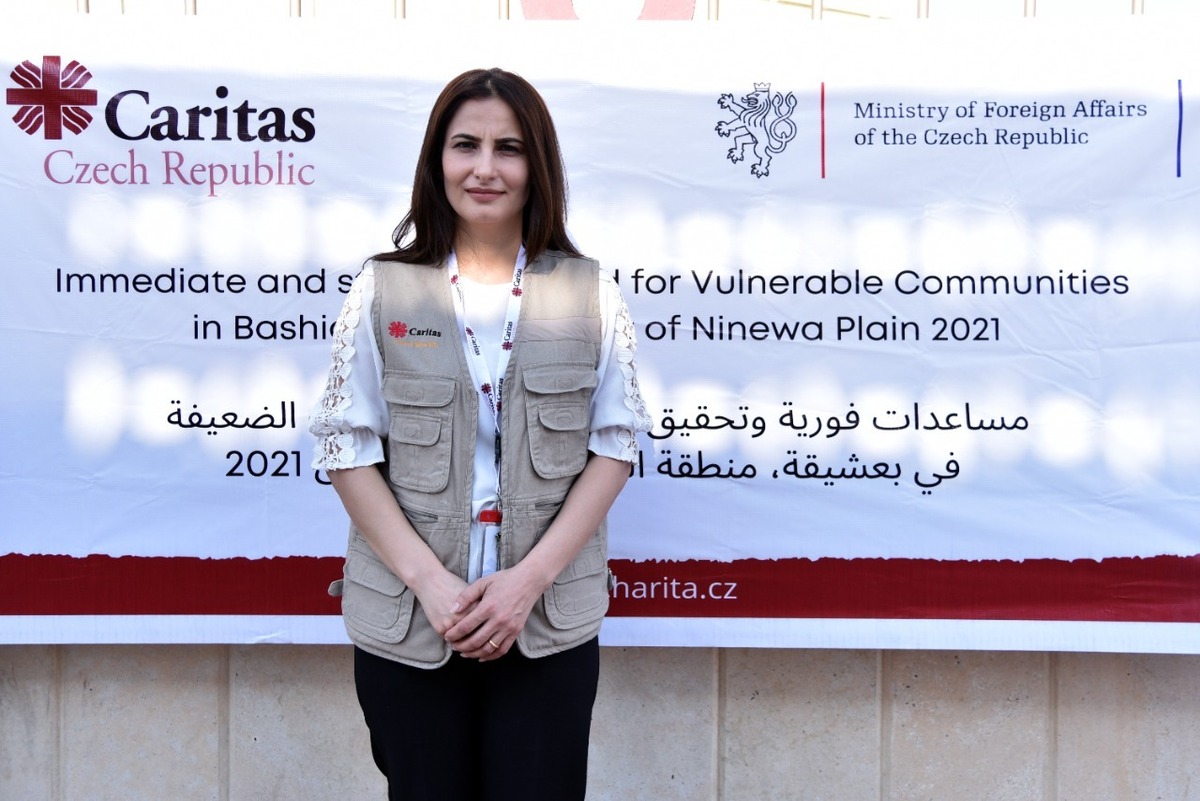Being a woman working in the humanitarian sector is not easy, especially in Iraq, where less than 15 percent of women participate in the labor market. This is among the lowest women labor participation rates worldwide. We have been talking to Jwan Najeeb Behnam, who works as a Caritas Czech Republic Livelihood Officer in Ninewa, Iraq. She shares her experience as a working woman, especially in non-governmental organizations.
You have been working in the field of humanitarian aid for some time now? Why have you chosen this sector?
I lived in Qaraqosh in the Ninewa Plains, but as most of the people of the area, we had to flee our homeland after the ISIS attacks in 2014. We could return back home 3 years later, after the liberation. Our city was utterly destroyed, and it was classified as a disaster area.
So, I joined non-governmental organizations because my land was in need of reconstruction, and I wanted to help return my district Qaraqosh to the way it was before the war that ISIS brought.
I started to work as a volunteer in several organizations and in different sectors in 2017 when we returned home. I have been working in this field for nearly 5 years now, so I have been able to contribute - even by a small part - to helping people return and helping them get their lives back.
What is it like being a female humanitarian worker in Iraq? I imagine there are many challenges a woman in such a position faces?
Well, to be honest, it is not easy to be a humanitarian woman in Iraq because of the customs and traditions of this region. Not that long time ago, it was rare to see women in this field because women are expected to stay at home and do tasks such as raising and taking care of children. The post-conflict situation has seen a rise in women's participation in the humanitarian sector. I feel lucky to have a family and husband who support me.
What do you like the most about your job?
When working in the field, I like facilitating training as I become closer to vulnerable people and see their needs. My job allows me to experience and learn new things every day. I also like that I'm working with a very cooperative and supportive team.
How important a role would you say humanitarian workers and organizations play in Iraq? Do you think working in this sector makes any changes to the situation in Iraq?
Yes, of course it makes difference. And I have seen all the changes beforehand.
Humanitarian workers play a crucial role as they help people in need. They are in direct contact with the people and areas exposed to the conflict and war.
After the liberation, it were non-government organizations that reconstructed and rehabilitated homes, hospitals and schools when we returned to home. They provided services, infrastructure and job opportunities for the region. The government played no role in helping the returnees. Without the contribution of the humanitarian sector to reduce the hardships that people are exposed to, we would not see these changes.
Have your skills improved while working in the humanitarian sector?
When I started working for Caritas, I had to go to Nimrud, and at that time, I did not have a car. Later I got my driving license and visited the area, and signed contracts with the beneficiaries. I also use my mediation skills, taught from Caritas, to resolve issues with beneficiaries and the community.
Even though it must be a challenging job at times, you seem to really enjoy it.
Absolutely! And I would like to encourage all people wishing to work in the humanitarian field, especially girls and women, not to hesitate It is a great job for men and women alike. Humanitarian work that comes from the heart is really rewarding!
Jwan Najeeb Behnam comes from Qaraqqosh, a city in the Ninewa Plains in Iraq. It is a place where she grew up and had lived until the war with ISIS forced her and her family out. After returning home, she joined several humanitarian organizations and now works as a Caritas Czech Republic Livelihood Officer in Ninewa. In 2009, she graduated from the Faculty of Physical Education. She is married and has a 13-year-old daughter and an 11-year-old son.






